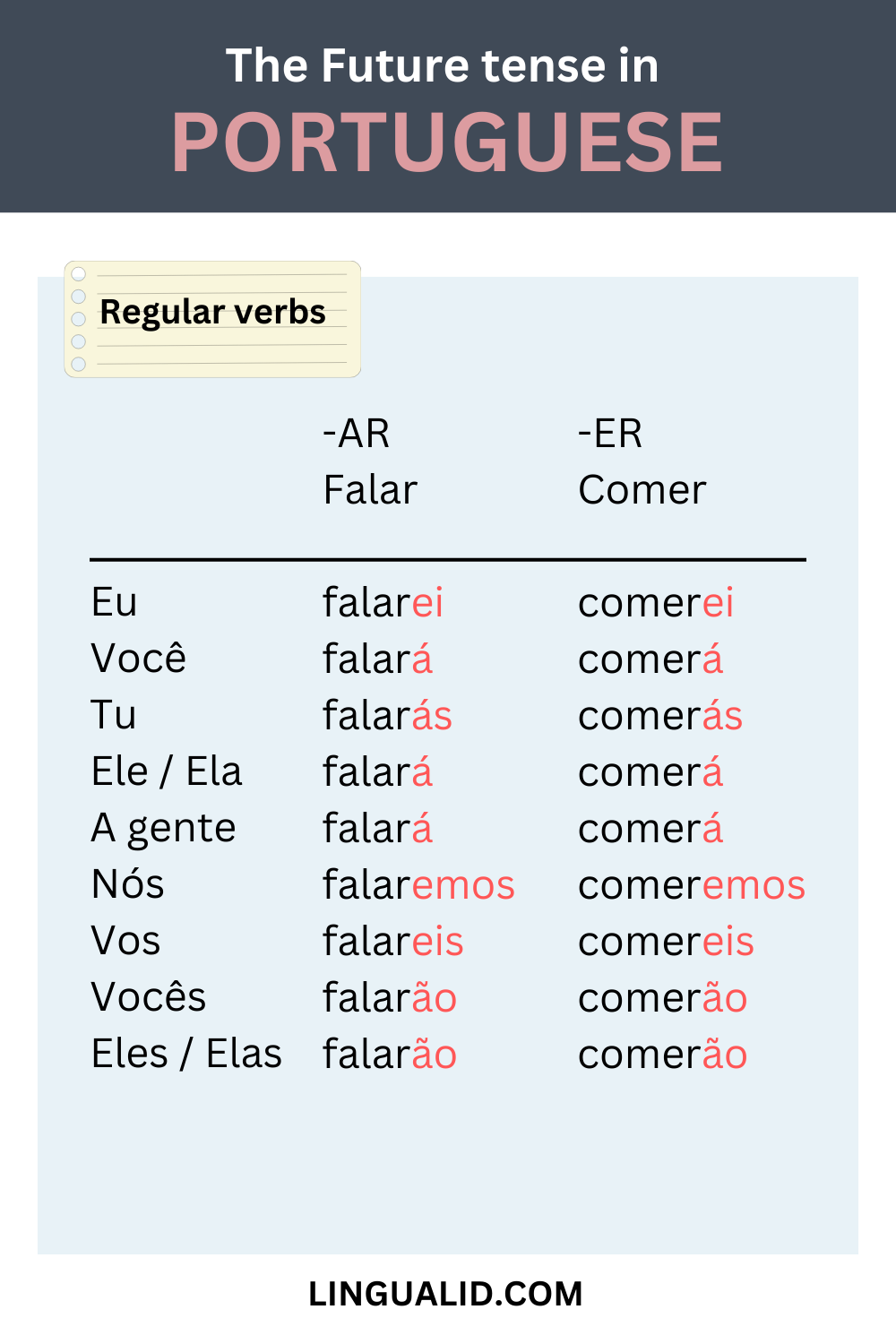In this lesson we will talk about the future tense in Portuguese, the two ways of expressing it, followed by examples.

In Portuguese, the future tense can be expressed in two ways: adding a suffix to the end or by using “ir + infinitive”.
Future Tense Form In Portuguese
All verbs add these endings to their infinitive, and we don’t remove the endings (unlike the present, the preterite and the imperfect tenses)
| Eu | -ei |
| Você | -á |
| Tu | -ás |
| Ele / Ela | -á |
| A gente | -á |
| Nós | -emos |
| Vos | -eis |
| Vocês | -ão |
| Eles / Elas | -ão |
Example: estudar (to study)
| Eu | estudarei |
| Você | estudará |
| Tu | estudarás |
| Ele / Ela | estudará |
| A gente | estudará |
| Nós | estudaremos |
| Vos | estudareis |
| Vocês | estudarão |
| Eles / Elas | estudarão |
Falar (to speak)
| Eu | falarei |
| Você | falará |
| Tu | falarás |
| Ele / Ela | falará |
| A gente | falará |
| Nós | falaremos |
| Vos | falareis |
| Vocês | falarão |
| Eles / Elas | falarão |
Comer (to eat)
| Eu | comerei |
| Você | comerá |
| Tu | comerás |
| Ele / Ela | comerá |
| A gente | comerá |
| Nós | comeremos |
| Vos | comereis |
| Vocês | comerão |
| Eles / Elas | comerão |
Fazer (to do)
| Eu | farei |
| Você | fará |
| Tu | farás |
| Ele / Ela | fará |
| A gente | fará |
| Nós | faremos |
| Vos | fareis |
| Vocês | farão |
| Eles / Elas | farão |
Note: fazer changes to far before adding the ending (irregular verb)
More examples:
Eu estudarei espanhol – I will study Spanish
Eu chegarei amanhã – I will arrive tomorrow
Eles viajarão para Marrocos – They will travel to Morocco
Note: you can practice what you’ve learned here, and learn how to pronounce each of the words in our Memrise course here, don’t know how to use the platform or sign up? we’ve got you covered in this easy-to-follow tutorial here.
Future Tense Using “ir + infinitive”
This is what we use in daily life + it’s easier, you only need to conjugate “ir” in the present and add the verb that you want to express in the future in its infinitive form, e.g. eu vou estudar espanhol (I will study Spanish)
Here is the conjugation of the verb “ir” in the present:
| Eu | Vou |
| Você | Vai |
| Ele / Ela | Vai |
| A Gente | Vai |
| Nós | Vamos |
| Vocês | Vão |
| Eles / Elas | Vão |
Eu vou chegar amanhã – I will arrive tomorrow
Eles vão viajar para Marrocos – They will travel to Morocco

Portuguese Future Tense Review
Short Answer Quiz:
- What are the two ways to express the future tense in Portuguese?
- When conjugating a regular verb in the future tense with a suffix, what do you do with the infinitive ending?
- Provide the future tense conjugation of the verb “falar” (to speak) for the pronoun “Nós” (we).
- What is an example of an irregular verb in Portuguese when forming the future tense with a suffix, and what change occurs?
- Translate the following sentence into Portuguese using the future tense with a suffix: “I will study Portuguese.”
- Which method of expressing the future tense is considered more common in everyday Portuguese conversation?
- To form the future tense using “ir + infinitive,” which verb needs to be conjugated, and in what tense?
- Translate the following sentence into Portuguese using the future tense with “ir + infinitive”: “They will travel to Brazil.”
- What is the difference in formality between using “Você” and “Tu” in Portuguese?
- Provide one reason why learning the “ir + infinitive” future tense construction might be considered easier for a Portuguese language learner.
Answer Key:
- The two ways to express the future tense in Portuguese are: 1) adding a suffix to the infinitive, and 2) using the construction “ir + infinitive.”
- When conjugating a regular verb in the future tense with a suffix, you keep the infinitive ending.
- The future tense conjugation of “falar” for “Nós” is “Nós falaremos.”
- The verb “fazer” (to do) is irregular in the future tense. It changes to “far” before adding the suffix.
- “Eu estudarei português.”
- Using “ir + infinitive” is considered more common in everyday conversation.
- The verb “ir” (to go) needs to be conjugated in the present tense.
- “Eles vão viajar para o Brasil.”
- “Você” is generally more formal than “Tu”.
- Learning the “ir + infinitive” construction may be considered easier because you only need to conjugate “ir” in the present tense and then add the infinitive of the main verb.
Happy learning!
Oualid Cheddadi is the founder of Lingualid, a platform that inspires independent language learners worldwide, regardless of the language they are learning. The name “Lingualid” is derived from the Portuguese word for “language,” “língua,” and the last three letters of Oualid’s name, “Lid.”



